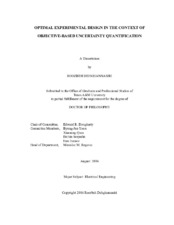| dc.contributor.advisor | Dougherty, Edward R | |
| dc.creator | Dehghannasiri, Roozbeh | |
| dc.date.accessioned | 2016-09-22T19:51:47Z | |
| dc.date.available | 2018-08-01T05:58:21Z | |
| dc.date.created | 2016-08 | |
| dc.date.issued | 2016-08-03 | |
| dc.date.submitted | August 2016 | |
| dc.identifier.uri | https://hdl.handle.net/1969.1/158097 | |
| dc.description.abstract | In many real-world engineering applications, model uncertainty is inherent. Largescale dynamical systems cannot be perfectly modeled due to systems complexity, lack of enough training data, perturbation, or noise. Hence, it is often of interest to acquire more data through additional experiments to enhance system model. On the other hand, high cost of experiments and limited operational resources make it necessary to devise a cost-effective plan to conduct experiments. In this dissertation, we are concerned with the problem of prioritizing experiments, called experimental design, aimed at uncertainty reduction in dynamical systems. We take an objective-based view where both uncertainty and modeling objective are taken into account for experimental design. To do so, we utilize the concept of mean objective cost of uncertainty to quantify uncertainty.
The first part of this dissertation is devoted to the experimental design for gene regulatory networks. Owing to the complexity of these networks, accurate inference is practically challenging. Moreover, from a translational perspective it is crucial that gene regulatory network uncertainty be quantified and reduced in a manner that pertains to the additional cost of network intervention that it induces. We propose a criterion to rank potential experiments based on the concept of mean objective cost of uncertainty. To lower the computational cost of the experimental design, we also propose a network reduction scheme by introducing a novel cost function that takes into account the disruption in the ranking of potential experiments caused by gene deletion. We investigate the performance of both the optimal and the approximate experimental design methods on synthetic and real gene regulatory networks.
In the second part, we turn our attention to canonical expansions. Canonical expansions are convenient representations that can facilitate the study of random processes. We discuss objective-based experimental design in the context of canonical expansions for three major applications: filtering, signal detection, and signal compression. We present the general experimental design framework for linear filtering and specifically solve it for Wiener filtering. Then we focus on Karhunen-Loève expansion to study experimental design for signal detection and signal compression applications when the noise variance and the signal covariance matrix are unknown, respectively. In particular, we find the closed-form solution for the intrinsically Bayesian robust Karhunen-Loève compression which is required for the experimental design in the case of signal compression. | en |
| dc.format.mimetype | application/pdf | |
| dc.language.iso | en | |
| dc.subject | Objective-based experimental design | en |
| dc.subject | Mean objective cost of uncertainty | en |
| dc.subject | Intrinsically Bayesian robust operator | en |
| dc.subject | Gene regulatory networks | en |
| dc.subject | Canonical expansions | en |
| dc.subject | Wiener filtering | en |
| dc.subject | Signal compression | en |
| dc.title | Optimal Experimental Design in the Context of Objective-Based Uncertainty Quantification | en |
| dc.type | Thesis | en |
| thesis.degree.department | Electrical and Computer Engineering | en |
| thesis.degree.discipline | Electrical Engineering | en |
| thesis.degree.grantor | Texas A & M University | en |
| thesis.degree.name | Doctor of Philosophy | en |
| thesis.degree.level | Doctoral | en |
| dc.contributor.committeeMember | Yoon, Byung-Jun | |
| dc.contributor.committeeMember | Qian, Xiaoning | |
| dc.contributor.committeeMember | Serpedin, Erchin | |
| dc.contributor.committeeMember | Ivanov, Ivan | |
| dc.type.material | text | en |
| dc.date.updated | 2016-09-22T19:51:47Z | |
| local.embargo.terms | 2018-08-01 | |
| local.etdauthor.orcid | 0000-0001-7413-3437 | |


